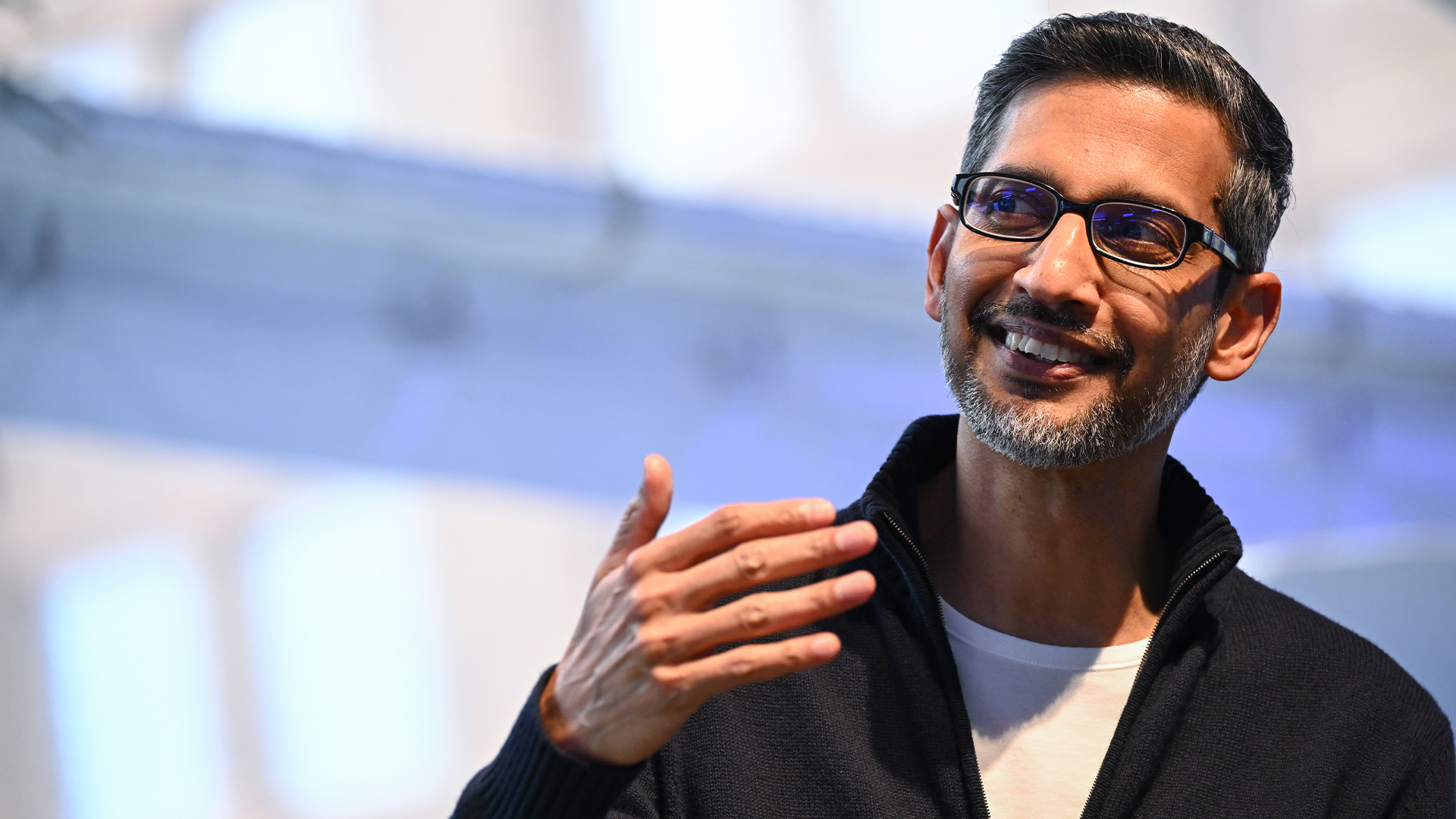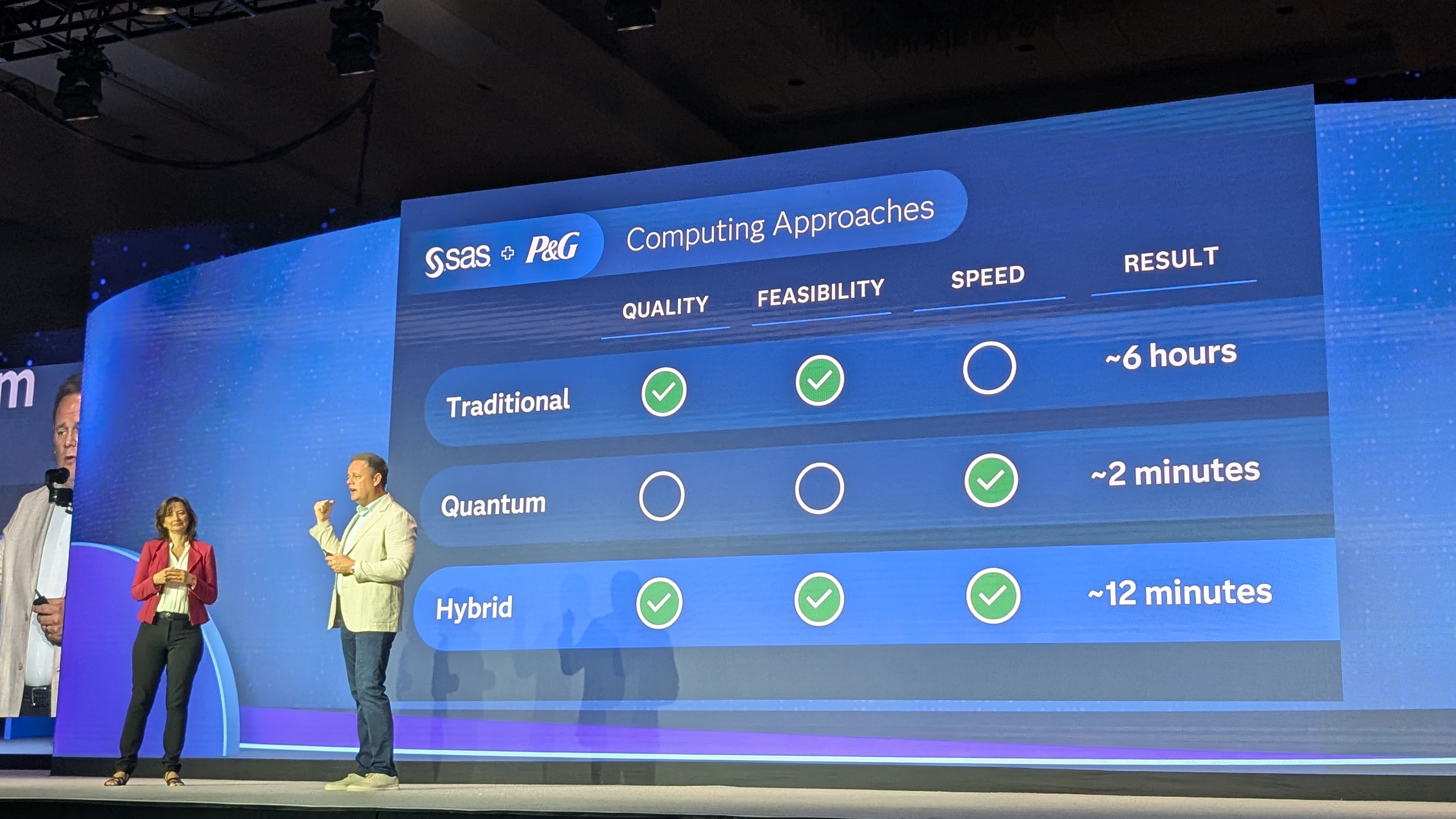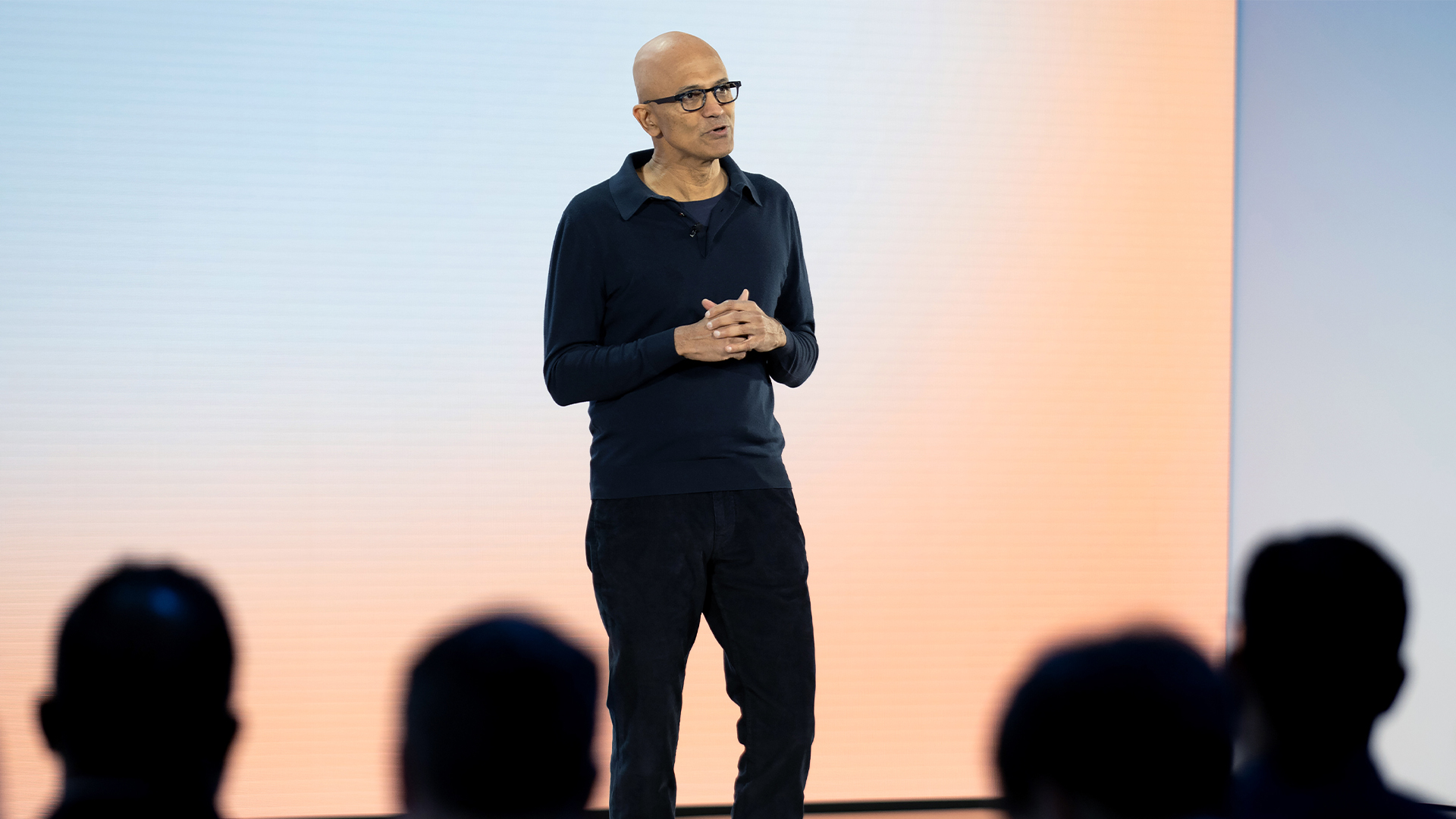IBM is targeting 'quantum advantage' in 12 months – and says useful quantum computing is just a few years away
Leading organizations are already preparing for quantum computing, which could upend our understanding of linear mathematical problems


Sign up today and you will receive a free copy of our Future Focus 2025 report - the leading guidance on AI, cybersecurity and other IT challenges as per 700+ senior executives
You are now subscribed
Your newsletter sign-up was successful
IBM predicts it will reach “quantum advantage” in the next 12 months, meaning the time at which quantum algorithms can begin to complement traditional computing for widespread benefits.
The technology giant has been working on quantum computing for decades, but in recent years has signaled that quantum computers that can deliver tangible benefits to businesses are just around the corner.
Further, the firm predicts return on investment (ROI) in quantum across select industries within the next three to five years.
For example, HSBC has partnered with IBM to develop a new machine learning (ML) model for trades, with the intention of improving its margin via better predictions of buying and selling prices.
IBM took a year’s worth of HSBC’s data and applied a quantum algorithm for ‘feature selection’, a process that highlights the most relevant aspects of a dataset to improve model performance.
In tests, IBM and HSBC tracked a 34% increase in successful trades.
At a briefing on the breakthroughs, Adam Hammond, business leader at IBM Quantum EMEA, told assembled media that the model is not yet in production and still needs more training.
Sign up today and you will receive a free copy of our Future Focus 2025 report - the leading guidance on AI, cybersecurity and other IT challenges as per 700+ senior executives
Nevertheless, it acts as a tangible example of how quantum algorithms could improve business performance. Outside of banking, Hammond said IBM is hoping to apply quantum computing to a wide range of sectors.
His team is working with Moderna on mRNA vaccines, the Wellcome Sanger Institute on genomics, Boeing on surface chemistry, and Bosch on superconducting hardware, as well as organizations in the farming, life sciences, and electric vehicles sectors.
A seismic shift in compute complexity
At the center of IBM’s latest quantum roadmap is Nighthawk, its new quantum processor which can process up to 120 qubits linked together for a 30% overall increase in complexity.
“One of the key factors in getting to quantum advantage and to useful quantum is being able to fit the size of your problem into the capabilities of the machine that's running it,” Hammond explained.
IBM measures quantum performance in ‘operations per circuit’ (OPC), with today’s chips capable of 5,000 OPC. The Nighthawk chip will use these 5,000 operations more efficiently, Hammond explained, providing a boost in the complexity of tasks that Nighthawk can complete.
On a technical level, IBM has unlocked this capability by moving from a chip layout in which each qubit was entangled with two or three others to one where each qubit is reliably entangled with four qubits.
Hammond noted that this new configuration could lead to breakthroughs in chemistry in particular, as its lattice-like structure mirrors the makeup of the chemical world.
By 2028, IBM believes it will be able to reach 15,000 OPC, tackling problems three times larger than today’s. The next year, in 2029, it is targeting full quantum fault tolerance, at which point its quantum systems will be able to produce reliable results.
The company said it will achieve this with its new large-scale Starling quantum computer, powered by its Loon chip, which will represent a seismic leap forward for the quantum sector.
It’s aiming for this system to run at 100 million OPC, the computational equivalent of one quindecillion of the world’s most powerful supercomputers – a one followed by 48 zeroes.
When ITPro asked Hammond to explain what this would mean for the 2030s, he explained that it was incredibly difficult to predict the future.
“Three years ago, the largest machine we had was 27 qubits – you can simulate a 27 qubit machine on your laptop,” he said.
“It's only when you get above 100 qubits that actually you can't even simulate that on the largest supercomputer in the world. In fact, actually, if you network them all together, you wouldn't be able to simulate it.
“So the hardware has made a really dramatic increase in capability in the last three years. Three years ago, I wasn't talking about real use cases with clients. We were talking about doing experimentation. Now we're really actively exploring real use cases in preparation for machines being large enough to run those in production.”
Despite this, Hammond was resolute that classical computers and AI algorithms will continue to play a huge role in the future of computing. This is because quantum computers are best suited to complex, linear equations – and worse at tasks that today’s computers excel at.
“So in the same way a GPU solves matrix algebra, what a quantum computer does is it solves complex sets of linear equations – and it so happens that that's something that classical computers really aren't very good at doing,” he said.
“So optimization tasks actually simulating nature at a sort of a molecular level, is a complex set of linear equations, linear algebra, if you're doing computational fluid dynamics. So I think what will happen is that some of those tasks that we currently use super computers to do today may well get offloaded to quantum processes.
“But that's all quantum machines do. You're never going to have Excel running on a quantum processor – you might have a particular bit of maths in your Excel spreadsheet that a quantum processor can help you with, but they're never going to replace it.”
Going forward, IBM is also looking at how these complex quantum algorithms can be integrated in existing enterprise architectures.
Hammond said in the case of HSBC, it would need to consider how its machine learning model for trading could be made to follow its checks for security, privacy, performance, and resilience.
Make sure to follow ITPro on Google News to keep tabs on all our latest news, analysis, and reviews.
MORE FROM ITPRO
- Understanding quantum-safe AI and how to create resilient defenses
- Preparing for the quantum revolution
- Post-quantum cryptography is now top of mind for security leaders

Rory Bathgate is Features and Multimedia Editor at ITPro, overseeing all in-depth content and case studies. He can also be found co-hosting the ITPro Podcast with Jane McCallion, swapping a keyboard for a microphone to discuss the latest learnings with thought leaders from across the tech sector.
In his free time, Rory enjoys photography, video editing, and good science fiction. After graduating from the University of Kent with a BA in English and American Literature, Rory undertook an MA in Eighteenth-Century Studies at King’s College London. He joined ITPro in 2022 as a graduate, following four years in student journalism. You can contact Rory at rory.bathgate@futurenet.com or on LinkedIn.
-
 AWS CEO Matt Garman isn’t convinced AI spells the end of the software industry
AWS CEO Matt Garman isn’t convinced AI spells the end of the software industryNews Software stocks have taken a beating in recent weeks, but AWS CEO Matt Garman has joined Nvidia's Jensen Huang and Databricks CEO Ali Ghodsi in pouring cold water on the AI-fueled hysteria.
-
 Deepfake business risks are growing
Deepfake business risks are growingIn-depth As the risk of being targeted by deepfakes increases, what should businesses be looking out for?
-
 Sundar Pichai thinks commercially viable quantum computing is just 'a few years' away
Sundar Pichai thinks commercially viable quantum computing is just 'a few years' awayNews The Alphabet exec acknowledged that Google just missed beating OpenAI to model launches but emphasized the firm’s inherent AI capabilities
-
 Future-proofing cybersecurity: Understanding quantum-safe AI and how to create resilient defenses
Future-proofing cybersecurity: Understanding quantum-safe AI and how to create resilient defensesIndustry Insights Practical steps businesses can take to become quantum-ready today
-
 IBM and AMD are teaming up to champion 'quantum-centric supercomputing' – but what is it?
IBM and AMD are teaming up to champion 'quantum-centric supercomputing' – but what is it?News The plan is to integrate the two technologies to create scalable, open source platforms
-
 SAS thinks quantum AI has huge enterprise potential – here's why
SAS thinks quantum AI has huge enterprise potential – here's whyNews The analytics veteran has shone a light on three crucial quantum partnerships, as it warns organizations must innovate or fall prey to new threats
-
 The UK government wants quantum technology out of the lab and in the hands of enterprises
The UK government wants quantum technology out of the lab and in the hands of enterprisesNews The UK government has unveiled plans to invest £121 million in quantum computing projects in an effort to drive real-world applications and adoption rates.
-
 ‘This is the first event in history where a company CEO invites all of the guests to explain why he was wrong’: Jensen Huang changes his tune on quantum computing after January stock shock
‘This is the first event in history where a company CEO invites all of the guests to explain why he was wrong’: Jensen Huang changes his tune on quantum computing after January stock shockNews Nvidia CEO Jensen Huang has stepped back from his prediction that practical quantum computing applications are decades away following comments that sent stocks spiraling in January.
-
 ‘We’ve created an entirely new state of matter’: Satya Nadella hails Microsoft’s 'Majorana' quantum chip breakthrough
‘We’ve created an entirely new state of matter’: Satya Nadella hails Microsoft’s 'Majorana' quantum chip breakthroughNews Microsoft has unveiled a new chip it says could deliver quantum computers with real-world applications in ‘years, not decades'.
-
 QuEra Computing just raised $230 million to pioneer “fault-tolerant” quantum computing – and it even got Google’s seal of approval
QuEra Computing just raised $230 million to pioneer “fault-tolerant” quantum computing – and it even got Google’s seal of approvalNews QuEra Computing has raised $230 million in funding to drive development of 'fault tolerant' quantum computers, receiving backing from Google and SoftBank.